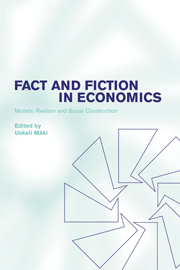Book contents
- Frontmatter
- Contents
- Notes on the contributors
- Preface
- I Introduction
- II Setting the scene
- III Economic models and economic reality
- IV The constitution of economic reality
- 11 Rational choice, functional selection, and “empty black boxes”
- 12 The reality of common cultures
- 13 Collective acceptance and collective attitudes: on the social construction of social reality
- 14 Hayek and cultural evolution
- 15 Putting evidence in its place: John Mill's early struggles with “facts in the concrete”
- V The institutions of economics
- Index
- References
15 - Putting evidence in its place: John Mill's early struggles with “facts in the concrete”
Published online by Cambridge University Press: 22 September 2009
- Frontmatter
- Contents
- Notes on the contributors
- Preface
- I Introduction
- II Setting the scene
- III Economic models and economic reality
- IV The constitution of economic reality
- 11 Rational choice, functional selection, and “empty black boxes”
- 12 The reality of common cultures
- 13 Collective acceptance and collective attitudes: on the social construction of social reality
- 14 Hayek and cultural evolution
- 15 Putting evidence in its place: John Mill's early struggles with “facts in the concrete”
- V The institutions of economics
- Index
- References
Summary
Overview
Experience versus assumed behavior
Mill was a realist in the most fundamental sense: he believed in the existence of an external world. Since he also believed that our knowledge of facts or phenomena is received via sense impressions, he had to show that there is indeed a reality independent of these. His approach to that problem remained much the same over time, though he experimented with various forms of words for articulating it. Basically it held two elements. First, not all sensations are fleeting. They can, and some do, retain the same properties under changed circumstances, even though those changes may affect appearances. For sensations having such persistent properties Mill adopted the Kantian label “perdurable.” Second, impressions and memories are personal but not necessarily individual: they may be common to vast numbers of individuals. That there are perdurable and public possibilities of sensation seemed to Mill sufficient to back his claim that there is an external world.
I will not probe Mill's grounds for realism. Rather, taking his realist convictions as fixtures of his mental apparatus, my aim here is to examine afresh his move in the early 1830s to portray inquiry in political economy as unavoidably a priori. He defined this phrase in his famous 1836 essay on method, “On the Definition of Political Economy; and on the Method of Investigation Proper to It.” A priori reasoning is “reasoning from an assumed hypothesis” ([1836b] 1967), Works IV, 325).
- Type
- Chapter
- Information
- Fact and Fiction in EconomicsModels, Realism and Social Construction, pp. 304 - 326Publisher: Cambridge University PressPrint publication year: 2002
References
- 2
- Cited by



